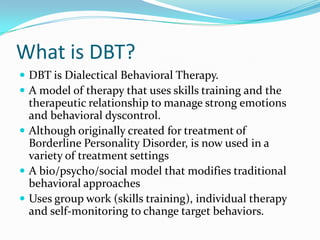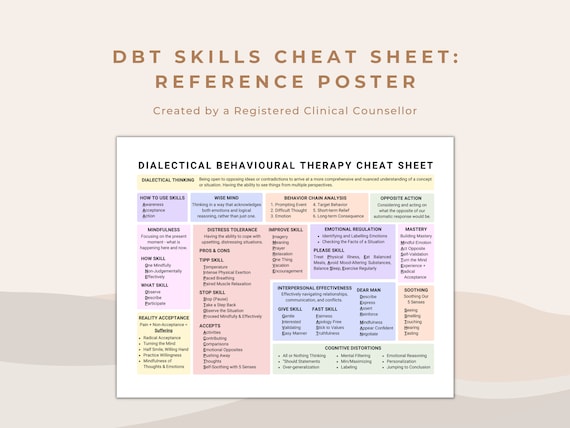Transforming Lives: DBT London's Holistic Method to Healing
Transforming Lives: DBT London's Holistic Method to Healing
Blog Article
Encouraging Individuals Through Efficient Dialectical Practices Treatment (DBT) Services: Building Stronger Mental Health And Wellness Foundations
In the realm of mental health and well-being, the importance of empowering people with efficient Dialectical Behaviour Therapy (DBT) services can not be overemphasized. By concentrating on the core principles of DBT, such as boosting emotional policy skills, improving social efficiency, building distress resistance strategies, and cultivating mindfulness techniques, individuals can embark on a trip in the direction of building stronger psychological health structures.
Comprehending the Core Concepts of DBT


One core principle of DBT is recognition. Another fundamental aspect is dialectics, which educates individuals to see scenarios from multiple point of views and discover the synthesis between contradictory ideas or emotions.
Additionally, the idea of dialectical abstaining is central to DBT. This principle motivates people to stay away from self-destructive actions while additionally accepting themselves. By comprehending and integrating these core concepts, specialists can successfully carry out DBT strategies and assistance people in their trip in the direction of psychological guideline and psychological health.
Enhancing Psychological Regulation Skills
Developing proficiency in taking care of feelings is a basic facet of cultivating emotional health and social effectiveness - DBT London. Enhancing emotional law abilities is a core part of Dialectical Practices Therapy (DBT) that gears up individuals with the tools to navigate extreme feelings in a healthy and balanced and constructive fashion. With DBT, individuals learn to determine, comprehend, and control their emotions, resulting in improved psychological wellness end results
DBT emphasizes the importance of mindfulness, which entails being existing in the moment without judgment. This practice allows individuals to observe their emotions without becoming bewildered by them, enhancing their ability to react properly instead of react impulsively. By cultivating mindfulness, people can develop a greater feeling of self-awareness and emotional control.
In addition, DBT educates functional abilities such as distress resistance and emotion regulation strategies to help people handle tough feelings. By learning these abilities, individuals can lower impulsive actions, boost decision-making, and strengthen their partnerships with others. Inevitably, improving emotional guideline skills via DBT equips individuals to lead more meeting and balanced lives.

Improving Interpersonal Efficiency
Having actually developed a solid structure in psychological regulation skills within the structure of Dialectical Behaviour Therapy (DBT), the focus now moves in the direction of improving social performance. Improving social performance is a vital part of DBT as it furnishes people with the essential abilities to navigate social interactions, communicate efficiently, established boundaries, and build much healthier relationships.
In DBT, social effectiveness skills are educated through components that focus on areas such as assertiveness, reliable interaction, and social analytical. By discovering these skills, people can improve their ability to express their wishes and needs, keep self-esteem, and develop stronger links with others.
Practicing mindfulness is an important part of boosting social effectiveness within the DBT structure. Mindfulness allows people to be present in their communications, pay attention actively, and react thoughtfully instead of react impulsively. By integrating mindfulness right into their day-to-days live, individuals can grow better self-awareness and emotional law, which are crucial for successful social communications.
Building Distress Resistance Techniques
Checking out effective methods for taking care of psychological distress is vital for people seeking to improve their coping abilities and resilience. Structure distress resistance techniques is a vital facet of Dialectical Behaviour Therapy (DBT) that equips people to navigate difficult feelings without coming to be overwhelmed - DBT London. One fundamental strategy in DBT for distress tolerance is the acronym "ACCEPTS," which means Tasks, Adding, Contrasts, Feelings, Pressing away, Thoughts, and Sensations. By making use of these strategies, people can properly cope with traumatic situations and manage their emotional responses.
In addition, mindfulness techniques play a substantial duty in building distress tolerance. Mindfulness encourages individuals to remain existing in the minute without judgment, enabling them additional resources to observe their ideas and feelings without responding impulsively. This recognition allows people to tolerate distress better and establish a higher sense of control over their reactions.
Along with these techniques, developing a customized distress tolerance plan with the guidance of a qualified therapist can provide people with a tailored technique to handling emotional distress - DBT London. By including these methods into daily life, people can reinforce their psychological wellness structures and boost their general well-being

Cultivating Mindfulness Practices
To grow their distress tolerance techniques even more, people can concentrate on growing mindfulness practices as a complementary method within the structure of Dialectical Practices Treatment (DBT) Mindfulness, a vital component of DBT, includes focusing on the here and now minute without judgment. By cultivating mindfulness, people can boost their recognition of ideas, feelings, and physical experiences, advertising a much deeper understanding of themselves and their experiences.
Mindfulness techniques in DBT consist of my link strategies such as conscious breathing, body scans, and observing ideas without add-on. These techniques urge people to create a non-reactive position in the direction of their internal experiences, enabling them to respond to difficult circumstances with higher quality and composure. By integrating mindfulness into everyday routines, individuals can learn to control their emotions much more properly, lower spontaneous actions, and grow a feeling of inner peace.
Through cultivating mindfulness practices, individuals undertaking DBT can construct a solid foundation for handling anxiety, enhancing connections, and enhancing total health. By incorporating mindfulness into their healing trip, individuals can develop beneficial abilities that empower them to browse life's difficulties with durability and self-awareness.
Final Thought
To conclude, reliable Dialectical Behavior Treatment (DBT) solutions play a critical function in empowering people to develop stronger psychological health structures. By recognizing the core principles of DBT, boosting psychological regulation skills, enhancing social effectiveness, building distress resistance techniques, and growing mindfulness practices, people are geared up with the essential tools to browse their emotions, connections, and obstacles in a more durable and flexible way. DBT solutions offer a thorough method to advertising psychological well-being and equipping people to lead fulfilling lives.
By focusing on the core concepts of DBT, such as enhancing emotional guideline abilities, improving social performance, building distress resistance strategies, and growing mindfulness methods, people can embark on a journey towards structure more powerful psychological health structures. Enhancing psychological regulation skills is a core element of Dialectical Practices Therapy (DBT) that outfits individuals with the check devices to browse extreme feelings in a useful and healthy and balanced manner.Moreover, DBT educates practical skills such as distress tolerance and emotion regulation techniques to assist individuals handle difficult emotions.To strengthen their distress tolerance methods further, individuals can focus on cultivating mindfulness practices as a complementary approach within the framework of Dialectical Behaviour Treatment (DBT) By recognizing the core concepts of DBT, boosting psychological guideline abilities, boosting social efficiency, constructing distress resistance methods, and cultivating mindfulness practices, people are outfitted with the necessary tools to browse their feelings, connections, and difficulties in a much more adaptive and resilient way.
Report this page